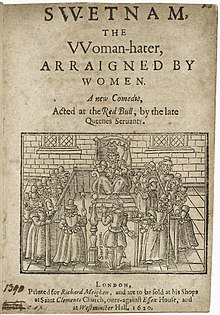
Back Misogynie ALS كره النساء Arabic স্ত্ৰী বিদ্বেষ AS Qadın düşmənliyi AZ قادین دوشمنلیگی AZB Мізагінія BE Cenéh wadon BEW Мизогиния Bulgarian নারী বিদ্বেষ Bengali/Bangla Mizoginija BS

| Part of a series on |
| Discrimination |
|---|
 |
| Part of a series on |
| Feminism |
|---|
 |
|
|
Misogyny (/mɪˈsɒdʒɪni/) is hatred of, contempt for, or prejudice against women or girls. It is a form of sexism that can keep women at a lower social status than men, thus maintaining the social roles of patriarchy. Misogyny has been widely practised for thousands of years. It is reflected in art, literature, human societal structure, historical events, mythology, philosophy, and religion worldwide.
An example of misogyny is violence against women, which includes domestic violence and, in its most extreme forms, misogynist terrorism and femicide. Misogyny also often operates through sexual harassment, coercion, and psychological techniques aimed at controlling women, and by legally or socially excluding women from full citizenship. In some cases, misogyny rewards women for accepting an inferior status.
Misogyny can be understood both as an attitude held by individuals, primarily by men, and as a widespread cultural custom or system. Sometimes misogyny manifests in obvious and bold ways; other times it is more subtle or disguised in ways that provide plausible deniability.
In feminist thought, misogyny also includes the rejection of feminine qualities. It holds in contempt institutions, work, hobbies, or habits associated with women. It rejects any aspects of men that are seen as feminine or unmanly.[undue weight? – discuss] Racism and other prejudices may reinforce and overlap with misogyny.
According to the Oxford English Dictionary the English word "misogyny" was coined in the middle of the 17th century from the Greek misos 'hatred' + gunē 'woman'.[1] The word was rarely used until it was popularised by second-wave feminism in the 1970s.
- ^ "MISOGYNY | Meaning & Definition for UK English | Lexico.com". Archived from the original on 26 February 2020.